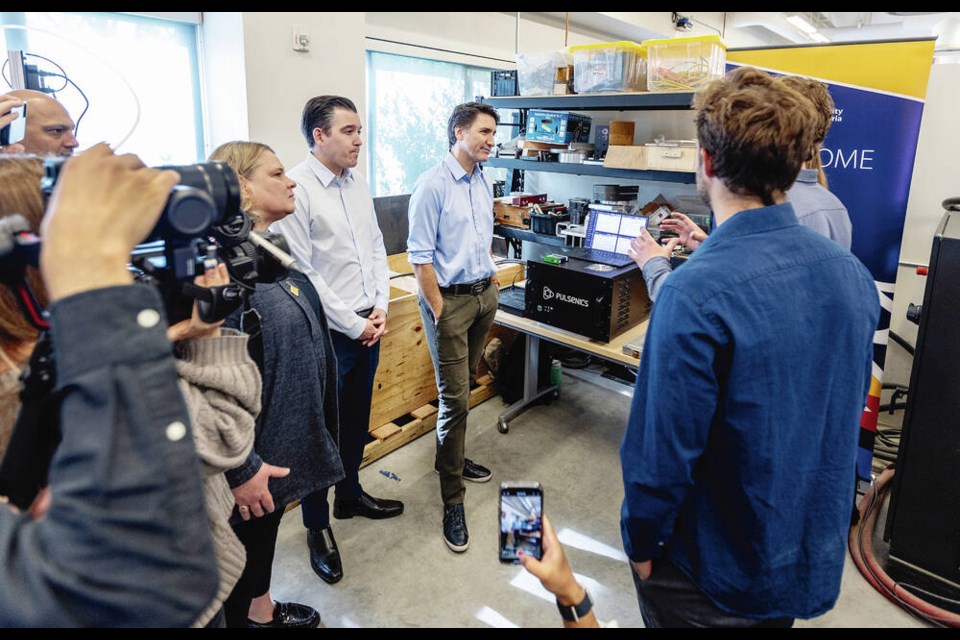Prime Minister Justin Trudeau was at the University of Victoria on Friday highlighting $4.6 billion earmarked in the federal budget for research as well as supports for millennials and GenZs.
Trudeau toured the university’s CanAssist wing of the CARSA building to hear from science and engineering students and faculty about their latest research, before giving a brief budget address, then meeting with Victoria Mayor Marianne Alto in the afternoon.
Trudeau said the budget released this week makes historic investments in Canadian research and innovation, pointing to a $734-million boost for research, some of which will go toward the TRIUMF subatomic physics research lab at the University of B.C., founded with UVic and Simon Fraser University.
“We’re a government that believes in science, and we’re making the kinds of investments that will be key to unlocking immense economic potential,” said Trudeau, noting the Conservative Party will vote against the budget.
“Conservative politicians don’t think we should be investing in science and housing and childcare and they don’t think we should be asking the wealthiest to pay a bit more.”
The federal budget also includes a $2.6-billion package that goes toward the number and value of scholarships, student grants, fellowships and housing allowances to help students where “housing is particularly expensive, like Victoria,” he said.
Another $1.3 billion in the education envelope will be used to extend for another year an increase in the full-time Canada Student Grants from $3,000 to $4,200 per year, as well as the interest-free Canada Student Loans, which will remain at $300 per week for another year, up from $210.
The funding will also increase the housing allowances for the Canada Student Financial Assistance Program, which will help an estimated 79,000 additional students per year with housing costs.
Trudeau acknowledged young adults may feel like “the deck seems stacked against you right now” in terms of rental costs and the dream of home ownership, but he said “these are the things that we’re focused on changing in this budget.”
“That’s why I’m so glad to be here at the University of Victoria,” said Trudeau. “We’re sharing our plan to create fairness for every generation, especially millennials and Gen Z.”
While young adults were a focus of the budget announcements, UVic’s student society posted a statement online complaining that university administration did not inform them the prime minister was visiting.
The university said in a statement that some graduate students and researchers were invited to the event, with invitations left up to the Prime Minister’s Office.
“We understand that many students, staff and faculty would have appreciated an opportunity to meet with the Prime Minister,” said a UVic spokesperson.
Later, asked by media about the controversial three-year decriminalization pilot in B.C. to end in 2026, Trudeau said the federal government is taking “a science-based, compassionate and rigorous approach to the opioid epidemic and the toxic drug supply challenges as a public health problem.”
Trudeau said the federal government has worked with the province to tweak the pilot to ensure “it’s working right” as well as carefully monitoring it, along with the province’s safe-supply approach.
Police have reported that pharmaceutical alternatives to illicit drugs are ending up in the hands of traffickers and youth, complaining police have no power to stop people using drugs in parks and playgrounds or in hospitals.
Asked what would trigger the government cancelling the province’s exemption under the Controlled Drugs and Substances Act that allows people to carry 2.5 grams of drugs for personal use, Trudeau said the federal government is working with the province on the issue.
“It’s not an adversarial position with B.C. — it’s a partnership on trying to respond to this crisis that is harming our community, people in communities,” he said.
Conservative Leader Pierre Poilievre has said he would end the experiment and this week urged Trudeau and B.C. Premier David Eby to cancel it.
While Trudeau spoke inside the UVic building, a modest gathering of Palestinian protesters outside chanted and held signs demanding an immediate and permanent ceasefire in Gaza.
The prime minister condemned last weekend’s attack by Iran on Israel and noted that as G7 nations gathered Thursday, Canada’s foreign minister met with her counterparts.
“All agree that everything needs to be done to prevent further escalation in the region to get back on track,” said Trudeau, “making sure there’s more humanitarian aid flowing into Gaza, make sure that there’s a ceasefire in which Hamas lays down its arms and in which the hostages are released.”
Canada continues to fight for a two-state solution as “the only long-term solution for peace and stability and democracy in the region,” Trudeau said, calling for “a secure democratic Israel living alongside a peaceful, secure, democratic Palestinian state.”
Trudeau is scheduled to meet with the president of Poland on Saturday and tour a ship at CFB Esquimalt.



